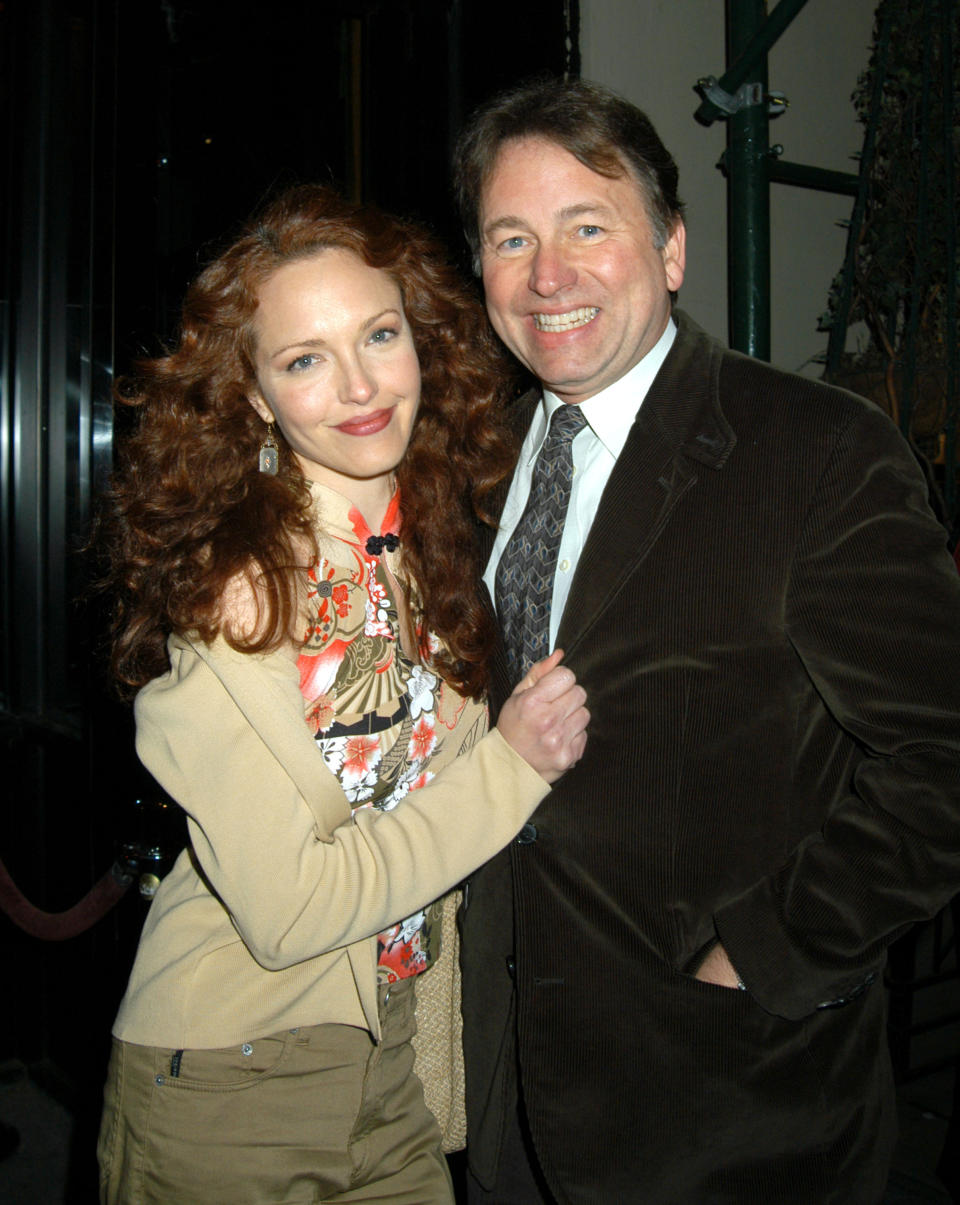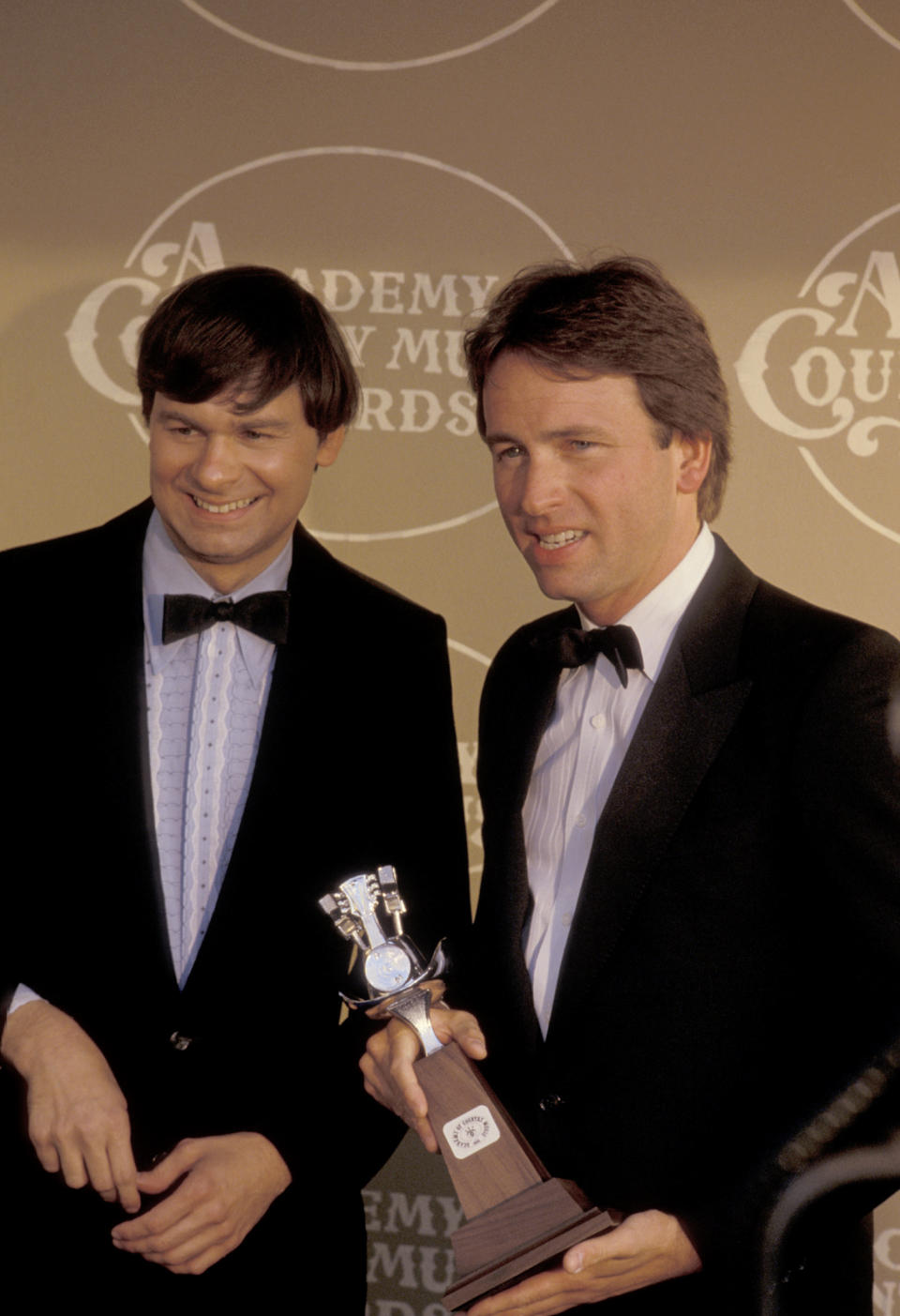Amy Yasbeck says John Ritter's true legacy is 'saving lives'

Amy Yasbeck has a vault of stories about life with husband John Ritter — the beloved Three’s Company and 8 Simple Rules star who died from an undetected aortic dissection on Sept. 11, 2003 — but she’s not here to retell them. Her purpose since his sudden death has been to protect others from his fate.
“There are a lot of ways of keeping John’s memory and spirit alive,” Yasbeck tells Yahoo Entertainment. “My job is to keep people’s aortas alive.”
It’s Aortic Dissection Awareness Week and the John Ritter Foundation for Aortic Health, founded by Yasbeck, and Genetic Aortic Disorders Association Canada organized a week of free virtual events to educate and connect patients, caregivers and doctors. It culminates in a big event Saturday with leading experts, workshops and support groups, which they are still registering for.
A post shared by Amy Yasbeck (@yasbeckamy) on Aug 14, 2020 at 6:34pm PDT
The actress — who appeared with Ritter in the Problem Child movies and has a long resume including TV’s Wings and films including Pretty Woman, Robin Hood: Men in Tights and The Mask — is hands-on in her participation with the conference, at which she’ll speak. She squeezes in our chat in between Zoom calls with medical experts and lovingly putting her mark on everything, including recruiting their friends (Joyce DeWitt, Sarah Silverman, Steven Weber, Cary Elwes, Tom Bergeron and Gilbert Gottfried) to appear in videos demystifying the condition — and staying up all night to edit them herself.
“I’m literally doing this interview lying in bed in the fetal position trying to breathe,” says Yasbeck, who makes you feel like you’ve known her forever. “I’ve been so over my head with stuff. It’s not a mystery why I’m dedicated to this, right?”
There wasn’t much information about aortic dissection — a tear in the inner layer of the aorta that allows blood to flow within the layers — when Ritter fell ill on the set of 8 Simple Rules and went to the ER, where he was misdiagnosed with a heart attack. Not only did he receive the wrong treatment, but he lost precious time. He died hours later — and his death, at age 54, stunned his family and fans around the world.
A post shared by Amy Yasbeck (@yasbeckamy) on Sep 17, 2020 at 6:03pm PDT
“When John passed away, I was at a loss to understand what was going on,” Yasbeck says. “It was explained to me on the night that it happened, sadly, but I was kind of left to my own devices to figure out: How did this happen?”
She recalls how at the time, news reports even misstated that Ritter had a heart attack.

“It’s not even the heart. Your aorta is not your heart. It’s the first structure of the vascular system,” says Yasbeck, who can tick off as many facts as one of those experts having devoted nearly two decades to forwarding the research. “A heart attack is a blockage. This is a tear in the lining of this kind of garden hose-shaped structure in your body. So the blood goes in between the walls of it. That’s how people die — because then the blood doesn’t go where it’s supposed to go.”
In Ritter’s case, “Everything they do to treat a blockage is the wrong thing to do for a tear. They pumped him with blood thinners, the whole deal.” (There were several lawsuits over Ritter’s death.)
Yasbeck says that a “thunderclap of pain in the chest or the back” is an indicator of an aortic dissection, or a ripping sensation, as well as numbness. “But there are other things: John was on the set of 8 Simple Rules and had pain, he had nausea. There’s also a sense of doom — because your body knows this is life-threatening thing.” (That sense of doom could explain Ritter’s final conversation with TV daughter, Kaley Cuoco before he left the set for the hospital.)
Those with aortic dissection or aneurysm often have a genetic predisposition. They learned it runs in Ritter’s family when his brother, Tommy, had the same thing — detected during echocardiogram — in 2007.
“Spoiler: It had a happy ending,” Yasbeck prefaces the story about Tommy, who underwent surgery to fix it. “It was exactly where John’s was — and we know where John’s was, sadly, because we had to see that. I had to see that,” during tests the night he died in the ER. “Ugh anyway — it’s hard to talk about this,” she admits, taking a minute to take a deep breath. “I have to steel myself sometimes and do it.”
Both brothers having aortic issues have made the family question the cause of death of Ritter patriarch Tex Ritter, a famous country singer.
“Tex died in the early ‘70s of a ‘massive heart attack,’” Yasbeck says of Ritter’s father. “But they didn’t really know that he died of a heart attack. He grabbed his chest and died. There was no autopsy. All these experts, and there are plenty, have since said, ‘Oh yeah, it was probably an aortic dissection.’ Unexplained early deaths in a family need very much to be thought of when you’re doing your family medical history.”

Yasbeck also wants people to know that aortic conditions don’t have to be a death sentence, which is why it’s important to identify the gene through genetic testing.
“You can treat an aneurysm medically before it ever dissects. You can slow it down,” she says. “This isn’t something like: ‘Oh sh**, I don’t want to know if I have this or not because there’s nothing I can do. This is how people used to think about it — like, ‘I don’t want to know. It’s a ticking time bomb in my chest.’ But it’s ticking. You can still do something about it.”
Since Ritter’s death, countless people have relayed stories to Yasbeck about how they were saved by, when unsure of what was ailing them, asking their doctor if it could be the “John Ritter thing.” Others have seen or read one of Yasbeck’s interviews on the topic and it ultimately saved their life. Because of that, she never wants to stop educating, even if her advocacy work is so exhausting that she’s left in the fetal position.
”I feel like I’ve got to be screaming and joking and laughing and bitching all the time, whichever way I can get it across,” says the still hysterically funny actress. “Because every second I’m not, I’m losing someone. It’s not enough for me to save my family. We’re all a family.”
As Yasbeck talks tirelessly about her advocacy, we stopped to ask: But how are you?
“I know, I know. Thank you for asking,” she says, clearly not wanting to make this about her. “I was told by a publicist after John died: ‘Be careful you don’t become a professional widow.’ I thought: Thank you and also f*** you because it’s not about being a widow. It’s about honoring John’s life in the way that he thought was most important, which was by — he quoted it many times — ‘plucking that golden thread that connects us all.’”
She continues, “John did that with comedy and he did that with drama — to a greater degree than people give him credit for — and he did that in a restaurant making somebody’s baby laugh until milk came out their nose. He did it in many ways. I don’t think people realize all of the work he did for United Cerebral Palsy,” inspired by his brother Tommy, who has it, “and every charity that asked him to host an event. He knew the celebrity that was granted to him wasn’t something you hold on to. It’s a currency — not a currency like money — but like electricity. It moves. So the way that John’s celebrity, and the currency of that, is still moving isn’t just through his shows and the way he made people laugh, but it’s through saving lives. I’m just a conduit for that but I’m honored to be.”
But how is she, we ask again.
“I know I didn’t answer your question,” she says. “I’m OK. Would I love to be working? Yes. That is my therapy — I love to work and work with other actors... I want to work all the time. I am always ready and willing to go — even in this crazy pandemic.”
“And I love all of John’s family and my amazing kid and my stepkids,” says the now empty-nester of their combined brood of four (three from his first marriage and one together), who help with John Ritter Foundation efforts. “I’ve got a sh**load of grandkids now, John’s grandkids.” There are five with one more on the way, she reports, adding proudly call her “Meemaw.”
A few years back she sold the home she shared with Ritter, explaining, “My house was way, way big and ridiculous,” and she was happy to downsize. “I live modestly and happily.”
And humbly. “If I stop to pat myself on the back,” over her advocacy efforts, “I lose time.”
Visit Aortic Dissection Awareness Week for more information about Saturday’s free symposium.

